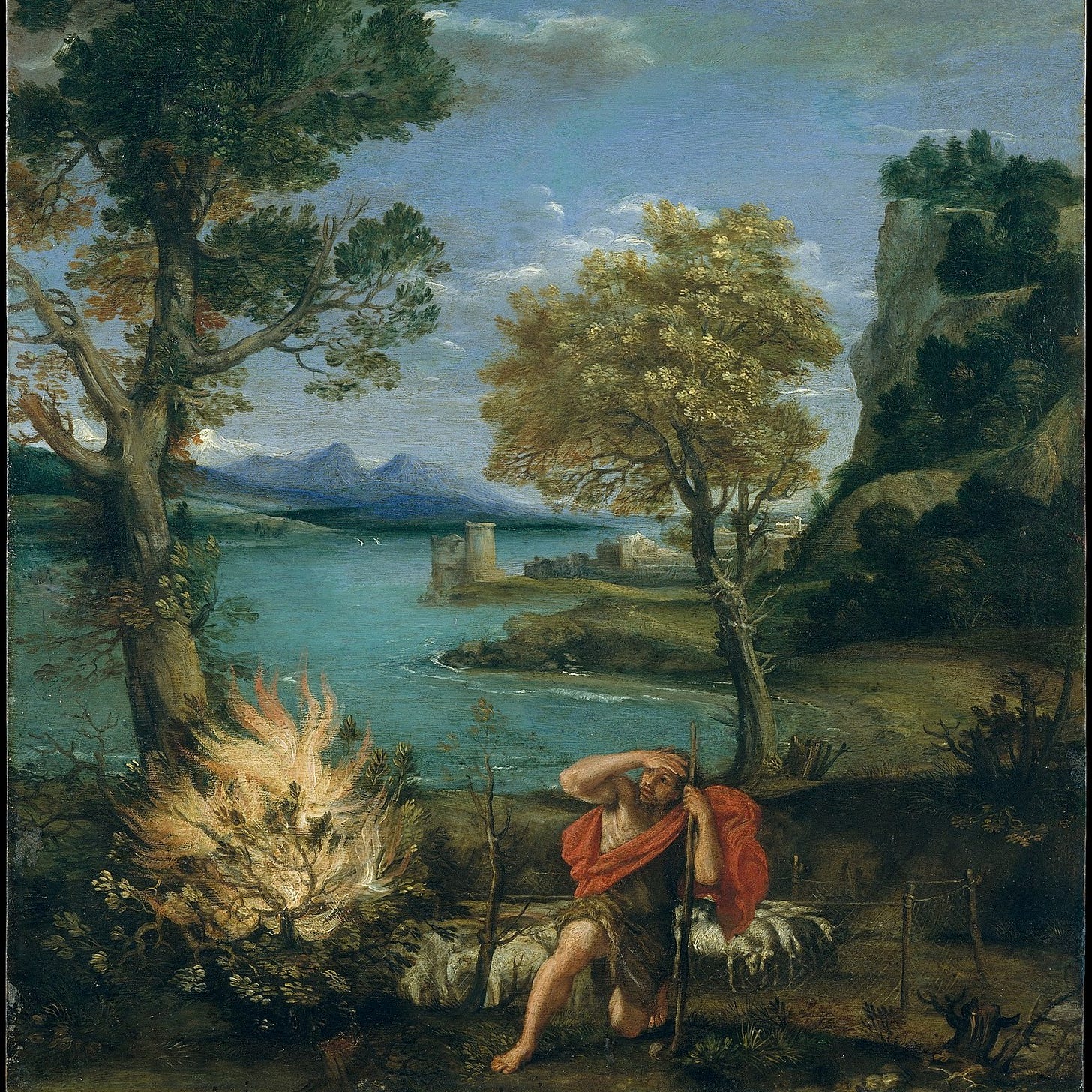10 Biblical Names for God Explained
YHWH, El Olam, and more!
The ancient names for God have modern lessons.
Whether it is the mystery of Tetragrammaton, the rare El Olam, or the YHWH Rapha, the names for God in the Old Testament all hold a hidden lesson for your spiritual life.
Also, you may have heard of Jehovah, but have you heard of why it is problematic?
Christians holds that each name for God reveals a part of His identity, and with it calls the soul to ascend to new knowledge and love.
Reminder: you can support our mission and get all our members-only content for just a few dollars per month:
New, full-length articles every Tuesday and Friday
The entire archive of members-only essays
Access to our paid subscriber chat room
10. Elohim
In the Old Testament, Elohim stands as one of the most profound and frequently used names for God, appearing over 2,500 times (Masoretic text). In the Greek Septuagint (250 BC), Elohim was rendered Theos or “God.” Derived from the Hebrew root ‘el, meaning “god” or “deity,” Elohim is a plural form yet consistently used with singular verbs when referring to the God of the Old Testament. For example, in Genesis 1:1: “In the beginning, Elohim created the heavens and the earth.” This unique grammatical structure of a plural noun with a singular verb is often read as a statement of God’s majesty, similar to the “royal we.” It is also unclear at times whether God (Elohim) refers to Himself in the plural or whether He is including the angels: “Then God [Elohim] said, ‘Let us make man in our image, after our likeness…’” (Gen 1:26; cf. 3:22; 11:17).
For the Christian, Elohim, a God somehow both singular and plural, invokes a foreshadowing of the Blessed Trinity: the one God in three Persons.
Overall, the term Elohim presents God as the transcendent Creator, something distinct from the pagan gods. He rules the cosmos and governs all nations—and Christians hold that Elohim invites you into this supremacy and purposeful design.
9. El Olam
El Olam, a lesser known and rare name for God, translates to “The Everlasting God” or “God of Eternity,” emphasizing His eternal, unchanging nature. Derived from the Hebrew ‘el (god) and olam (eternity), it appears in Genesis 21:33, where Abraham invokes El Olam after planting a tamarisk tree, signifying God’s enduring faithfulness to His covenant. This name portrays God as transcending time, unbound by the limitations of human existence, and steadfast in His promises across generations. El Olam invites you to find comfort in God’s eternal presence and fidelity, assuring them that His purposes and care remain constant in an ever-changing world—as God is always true to Himself.
While El Olam is limited to a single use on the Old Testament (Gen 21:33), the similar title of Elohim Olam is used (Is 40:28) along with more general praises of God’s everlasting nature (Ps 90:2; Deut 33:27, et al.).
8. El Shaddai
El Shaddai, a powerful and evocative name for God in the Old Testament, translates to “God Almighty” or “The All-Sufficient One,” highlighting His boundless strength and provision. Rooted in the Hebrew word shad, possibly linked to “mountain” or “sufficiency,” it appears in key passages like Genesis 17:1, where God reveals Himself to Abraham as El Shaddai, promising to make him the father of nations. It is used 48 times in the Old Testament (Masoretic text) and is often translated as Theos Pantokrator in the Septuagint. This name underscores God’s ability to fulfill His covenant promises, providing for His people in ways that surpass human limitation.
The title of El Shaddai should convey to you a God who couples unmatched power with nurturing care, inviting you to trust in His power and might that He always exercises in accordance with His fidelity.
7. El Elyon
El Elyon, a majestic and mysterious name for God in the Old Testament, translates to “God Most High,” emphasizing His supreme authority over all powers, divine or human. It is only used four times in the Old Testament (Masoretic text) and all in the same story: Where the mysterious Melchizedek, king of Salem, blesses Abraham in the name of El Elyon (Gen 14:18-20). It is a title of sovereignty and transcendence. Derived from ‘el (god) and elyon (most high or exalted), it portrays God as the ultimate ruler, unmatched by any rival gods or earthly kings. There is one other use of the phrase, but it is coupled with Elohim and the nuance arguably makes it distinct from the Melchizedek narrative (Psalm 78:35). El Elyon in the Septuagint is often Theos Hypsistos, “God Most High.”
Christians holds Melchizedek in great significance, as he is seen as a foreshadowing of Jesus Christ. He is a high priest, who is not a Levite, who is the king of Salem (peace), which is an antecedent to Jerusalem. He is presented without lineage and is associated with a sacrifice of bread and wine—prefiguring the Eucharist. The parallel is at the heart of the Book of Hebrews in the New Testament and gives a special consideration to the use of El Elyon as a title for God.
6. The Tetragrammaton (“YHWH”)
In the narrative of the burning bush, “the angel of the Lord” speaks out of the flames to Moses, saying: “I am the God of your father, the God of Abraham, the God of Isaac, and the God of Jacob” (Ex 3:6). God identifies himself as the God of Moses’ forefathers, the God of a people or tribe. Yet, when Moses asks God for His name, God famously responds: “I Am who I Am” (Ex 3:14). And that Moses should tell the people of Israel that “I Am has sent me to you” (Ex 3:14). It is considered the most intimate, holy name of God in the Old Testament and the most philosophically rich.
The term YHWH is derivative of the “I AM THAT I AM,” often being translated as the third-person “He is.” The name YHWH is also known as the “Tetragrammaton,” a Greek term, from “four” (tetra) and “letters” (gramma). In Hebrew, YHWH is written with four consonants, which form the most holy and personal name of God. It appears over 6,800 times in the Old Testament (Masoretic text). Eventually, the name was not spoken (or even written) out of reverence to God and other names were used as a substitute, as noted below.
Christians place great significance on the “I AM” statement or YHWH but see the name of Jesus as now being more revelatory and intimate. As taught in the New Testament:
Therefore God has highly exalted him and bestowed on him the name which is above every name, that at the name of Jesus every knee should bow, in heaven and on earth and under the earth, and every tongue confess that Jesus Christ is Lord, to the glory of God the Father (Phil 2:9-11).
Yet, the title of YHWH remains significant, especially for understanding the nature of God as Being-itself—as God is not reducible to a being within the created order but remains outside of time and creation.
5. Adonai
Adonai, a revered name for God in the Old Testament, translates to “Lord” or “Master” and encapsulates God’s supreme authority and sovereignty over all creation. Derived from the Hebrew root adon, meaning “lord” or “ruler,” it is used over 400 times in the Old Testament (Masoretic text). Abraham, for example, will speak of God as the Adonai YHWH (Gen 15:2).
In the Jewish tradition, Adonai is especially significant as the spoken substitute for the sacred Tetragrammaton (YHWH), reflecting deep reverence for God’s holy name. The Septuagint follows this practice, often replacing YHWH with the Greek Kyrios, meaning “Lord,” the equivalent of Adonai. In most English translations, when Adonai appears for YHWH, the word “LORD” will be used in capitalization or small caps to denote that YHWH is underneath.
You should see Adonai as a sign of God’s relational role to man, the divine master, who guides His followers only into what is good for them. To call God Adonai is a statement of trust—and when it is a stand-in for YHWH, it is a sign of the great holiness of who God is.
4. YHWH Yireh
YHWH Yireh, a profound name for God in the Old Testament, translates to “the YHWH Will Provide” or “the YHWH Who Sees,” encapsulating God’s foresight and paternal care. The title comes from the narrative of Abraham and Isaac where God provides a ram as a substitute for Isaac. In response, Abraham calls the place “YHWH Yireh” or “the LORD will provide” (Gen 22:14).
You should see in this title an aspect of God’s intimate care for you, as father caring for his children.
Also, you may have seen this title as “Jehovah Jireh,” but this actually a somewhat non-sensical term, as discussed below.
3. YHWH Rapha
YHWH Rapha (or YHWH Rophekha), a sacred name for God in the Old Testament, translates to “YHWH Who Heals,” revealing His compassionate power to restore you and make you whole. Found in Exodus 15:26, where God declares, “I am YHWH, your healer,” after transforming bitter water into sweet water at Marah, this name combines the Tetragrammaton YHWH with Rapha, from the Hebrew verb meaning “to heal” or “restore.” Used only once in the Old Testament, YHWH Rapha underscores God’s ability to heal physical ailments, mend emotional wounds, and renew spiritual vitality, promising wholeness to those who follow His covenant.
You have wounds from living in a broken world, and Christians invite you to look to YHWH Rapha as the healer of your soul. In the Old Testament, the Archangel Raphael, also drawn from rapha, is presented as a conduit of God’s healing power. Later, in Christianity, Jesus inherits the spirit of this title, as He is known as the Divine Physician.
Again, this title is sometimes rendered as Jehovah Rapha, but this is not the best translation, as noted below.
2. YHWH Sabaoth
YHWH Sabaoth, often translated as “YHWH of Hosts,” is a powerful name for God, highlighting His command over heavenly and earthly armies. Appearing over 280 times in the Old Testament (Masoretic text). It combines the sacred Tetragrammaton with sabaoth, meaning “armies” or “hosts.” In Hebrew, it is “YHWH Tseva’ot,” but this is transliterated into sabaoth in the Septuagint, i.e., Kyrios Sabaoth. This name depicts God as the divine warrior and sovereign leader of angelic forces, cosmic powers, and Israel’s armies. Most famously, it is used to describe the angelic worship around the throne of God: “Holy, holy, holy, is YHWH Sabaoth” (Is 6:3).
The title is often mistranslated as Jehovah Sabaoth in older texts, as discussed below.
In the Catholic worship, this name for God is said at every Mass at the Sanctus: “Holy, Holy, Holy Lord God of hosts,” or in Latin, “Sanctus, Sanctus, Sanctus Dominus Deus Sabaoth.” It joins earthly Christian worship with the heavenly worship of the angels around the throne of God. It is a testament, to you, that God’s reign is eternal and that you are under His care.
1. Jehovah…
Is Jehovah a legitimate name for God? Well… it is complicated.
Jehovah, a name for God found in older English Bible translations like the King James Version, is widely recognized but rooted in a historical mistranslation of the Hebrew Tetragrammaton, YHWH. In Jewish tradition, YHWH, considered too sacred to pronounce, was replaced in speech with Adonai (”Lord”), and scribes added the vowels from Adonai to the consonants of YHWH as a symbolic reminder. Medieval Christian scholars, unaware of this practice, read this symbolic term as Jehovah, popularized in the 13th century. Though not the original pronunciation, Jehovah nonetheless became popular in English Bibles and general Christian worship, especially amongst Protestants.
But, a more accurate understanding of God’s name is found in YHWH, the Tetragrammaton with Adonai or LORD serving as a pious replacement.
Knowledge as an invitation to love
Christians teach that God made you to know, to love, and to serve Him. In other words, knowledge is an invitation to love—and each name for God reveals a new aspect of knowing Him and thus a new opportunity to love Him.
Which name for God captures your imagination the most? Let us know!
Dcn. Harrison Garlick is a deacon, husband, father, Chancellor, and attorney. He lives in rural Oklahoma with his wife and five children. He is also the host of Ascend: The Great Books Podcast. Follow him on X at Dcn. Garlick or Ascend.







Thank you for this! Excellent article.
Only OT Names?
Why no NT Greek?